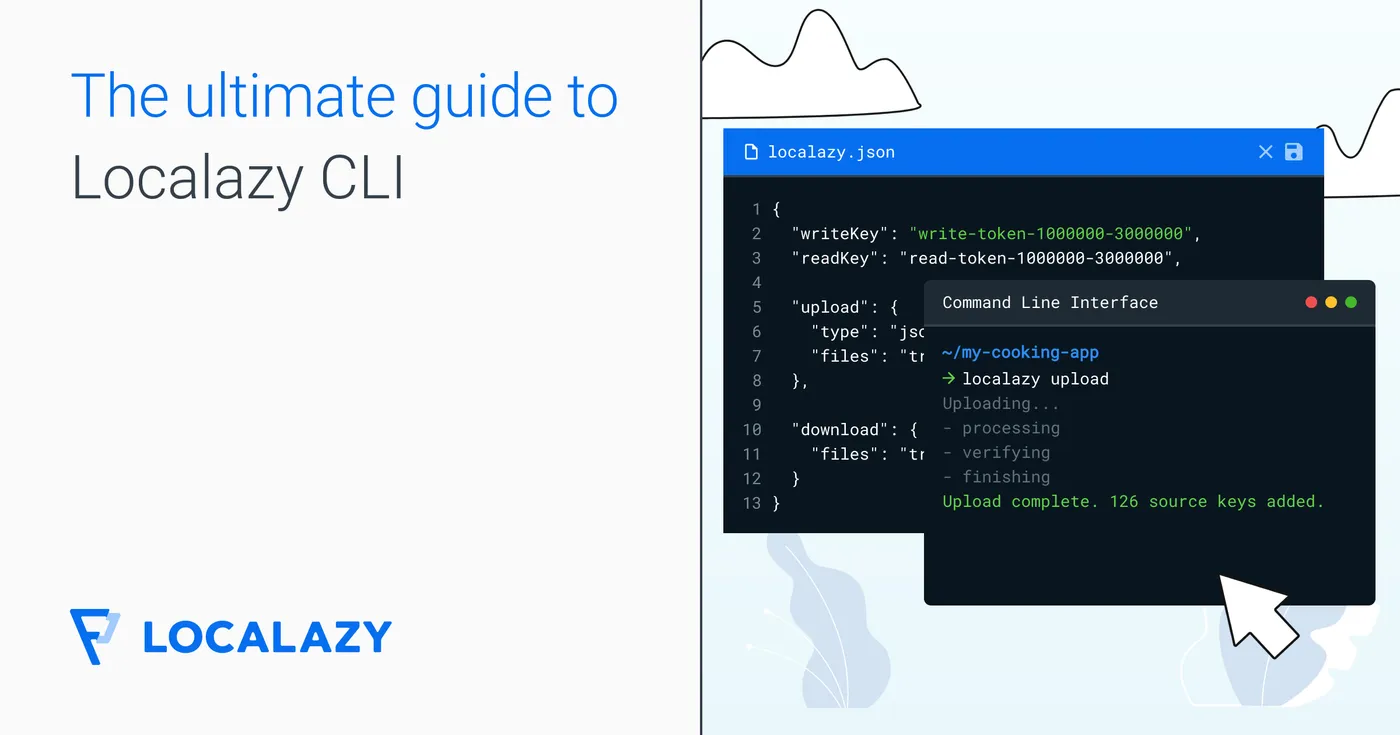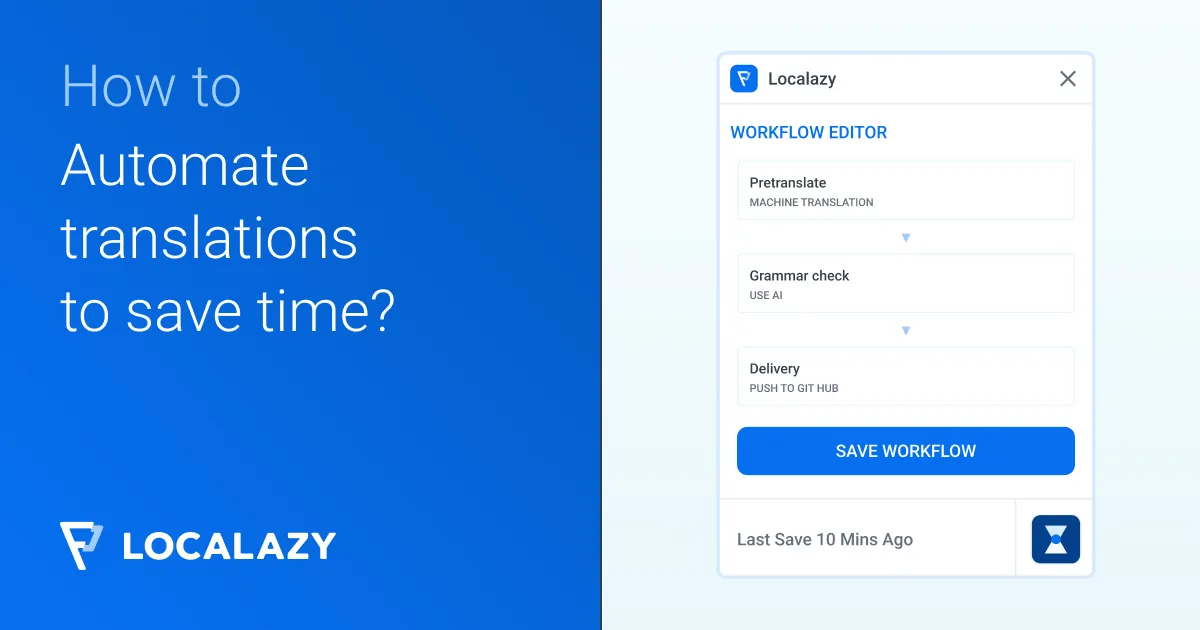You can use Localazy to work directly with TOML files. Our TOML parser is a flexible and configurable solution and you can fine-tune it for your specific needs.
Plain TOMLs #️⃣
Simple plain TOML files are supported out-of-the-box and no extra configuration is necessary.
key1 = "Key 1"
key2 = "Key 2"Structured TOMLs #️⃣
Structured TOMLs are supported by default and no configuration is necessary.
[parent]
[parent.child]
structured_key = "All is supported."Multilingual TOML #️⃣
Multilingual TOMLs allow defining more languages inside a single file. Localazy supports multilingual TOMLs with all the features describe in this document.
The top-level elements must be locale codes, and the corresponding source language as set in the project must be included.
The multilingual support must be enabled by adding multilingual to features in the upload section.
[en]
key = "in English"
[cs]
key = "in Czech"Locale codes can be defined using one of the supported methods:
- LL_RR_Scrp
- LL_Scrp_RR
- LL_RR#Scrp
- LL-RR-Scrp
- LL-Scrp-RR
- LL-RR#Scrp
- LL+RR+Scrp
- LL+Scrp+RR
- Locale name (English, German, Czech, …)
Where LL is the language code (ISO 639-1), RR is the region code (ISO 3166-2), Scrp is the script code (ISO 15924). Parameters RR and Scrp can be omitted.
If the locale is not known to Localazy, it’s skipped during the processing of uploaded files.
You can define the output format by adding lang_format=xxx to features in the upload section where xxx is one of the following:
- ll-rr#scrp
- ll-rr-scrp
- ll-scrp-rr
- ll-scrp_rr
- ll_rr_scrp
- ll_scrp_rr
- ll+rr+scrp
- ll+scrp+rr
- locale_name
- bcp
- android_noscript
- android
It’s a good practice to define the output format since it may not be inherited from the input file.
Object-based TOMLs #️⃣
By including content_as_object in features in the upload section, you can enable parsing of more complex TOML files where the content is based on sub-structures.
[key]
message = "String content"
description = "Optional additional comment for translators."Instead of message, you can use string, value, text, content or translation. Localazy remembers the field name and generates exactly the same document - just translated - for each of languages.
For the context information, instead of description, any of context, comment and developer_comment can be used.
All other features described in this document are still available including structured TOML, arrays and plurals parsing, etc.
Contextual metadata #️⃣
We have adopted metadata format from ARB files to our TOML support allowing to define additional metadata for the string using @key notation.
With arb_metadata in features in the upload section, you can enable ARB-style metadata. With the feature enabled, Localazy extracts content from description, context and placeholders and presents it to the translators to provide better context and improve translation quality.
For plurals and arrays, metadata can be defined using the base form without the suffix.
singleString = "This is just a normal string."
datePickerMinuteOne = "1 minute"
datePickerMinuteOther = "%minute minutes"
["@singleString"]
context = "views:Home page"
description = "Comment for the single string."
["@datePickerMinute"]
description = "Accessibility announcement for the selected minute on a time picker such as '15 minutes' or '15分'"
plural = "minute"
["@datePickerMinute".placeholders]
["@datePickerMinute".placeholders.minute]
description = "the number of minutes"
example = "15"Please note that quoting may be necessary and that you can only place metadata after your string definitions.
It’s also possible to specify context information (a comment for translators and character limit) using our own extension:
my_key = "This is a text of my key."
"@@localazy:comment:my_key" = "This is a comment for translators."
"@@localazy:limit:my_key" = "100"Please note that keys starting with @@localazy will not be exported to the output files. Do not overwrite your source files.
Arrays #️⃣
Arrays are good but beware changing number of items to prevent mismatching translations. If your files contain incomplete arrays, don’t use array features at all.
There are two ways how to define arrays.
TOML Arrays #️⃣
Standard TOML arrays are recognized as arrays and stored with Localazy in a corresponding way.
This feature can be enabled by adding array to features in the upload section.
[game]
difficulty = ["easy", "medium", "hard"]Arrays defined by suffix #️⃣
Localazy parses automatically also the suffixed variant shown below and present it to translators in a way that keeps items together and thus improves context and translation quality.
This feature can be enabled by adding array_br to features in the upload section.
"difficulty[0]" = "easy"
"difficulty[4]" = "normal"
"difficulty[7]" = "hard"
"difficulty[9]" = "extreme"The code above will be processed as an array and additional metadata will be stored, so Localazy can restore the indexes correctly.
All valid indexes are processed where valid index is non-negative integer value.
Plurals #️⃣
Beware that plurals may lead to different output for translated files due to how plurals are handled in different languages.
# English has only two plural forms:
pluralOne = "You have 1 item."
pluralOther = "You have %d items."
# Czech has three plural forms:
pluralOne = "Máte 1 položku."
pluralFew = "Máte %d položky."
pluralOther = "Máte %d položek."Localazy knows the rules for different languages and adapt its interface to assist translators to correctly translate all mandatory forms.
Your app should be able to handle this. We are also working on SDK to help you with this task.
Allowed plurals types are: zero, one, two, few, many, other.
Defined by suffix #️⃣
Several variants are available, and you can enable any of them and even combine them together. Localazy remembers how the plurals are formatted in the input file and keeps the same format for the translated files.
Add desired variants below to features in the upload section:
plural_postfix_sdfor single dot variant.plural_postfix_usfor underscore variant.plural_postfix_ccfor camelCase variant.plural_postfix_brfor [brackets] variant.
Examples:
[single_dot]
"users.one" = "There is one user."
"users.other" = "There are $number users."
[underscore]
"users_one" = "There is one user."
"users_other" = "There are $number users."
[camelCase]
"usersOne" = "There is one user."
"usersOther" = "There are $number users."
[brackets]
"users[one]" = "There is one user."
"users[other]" = "There are $number users."Defined as object #️⃣
Enabled by plural_object in features in the upload section.
[users]
one = "There is one user."
other = "There are $number users."The object is considered plural if and only if all items are key-value strings with keys being valid plural types (zero, one, two, few, many, other).
If the condition above is not met, the object is not considered plural and is parsed as a structured TOML.
Defined using i18Next plural #️⃣
Enabled by plural_i18next in features in the upload section.
Singular/plural variant:
key = "item"
key_plural = "items"All plural forms:
key_0 = "zero"
key_1 = "singular"
key_2 = "two"
key_3 = "few"
key_4 = "many"
key_5 = "other"Defined using ICU #️⃣
Enabled by plural_icu in features in the upload section.
users = "There are {COUNT, plural, one {one user} other {# users}}."Only one ICU plural can be used in the string as otherwise, it wouldn’t be possible to convert it to a specific Localazy plural structure. If more than two ICU plurals are contained, the string is kept in the original form.
Allowed plurals types are: zero (=0), one (=1), two (=2), few, many, other.
Other ICU types like gender, number, etc. can be used but will not be converted and will be kept in string in the original form.
Defined using pipeline #️⃣
Enabled by plural_pipeline in features in the upload section.
Singular/plural variant:
{
key_plural: "one | other"
}Skipping empty translations #️⃣
By default, empty translations are imported as empty strings. If your format use empty translations for untranslated texts, add skip_empty to features in the upload section.
Filtering untranslated strings #️⃣
By default, when the output file is generated, Localazy uses texts from the source languages when the translation in the exported language is missing.
This approach is safeguarding you from missing keys that can lead to crashes in some solutions/frameworks.
This feature can be disable by adding filter_untranslated to features in the upload section and reuploading your source language file.
Using key as the source translation #️⃣
There is a special format where the key is also the source language translation. It’s possible to enable the support for this format by adding source_is_key in features in the upload section.
"Text in the source language" = "Translation in the defined"Add BOM (for UTF encoding) #️⃣
If you need BOM (byte order mark) to be exported in the output file, please add add_bom to features in the upload section.
Features overview #️⃣
The table below is a summary of all available features for TOML parser.
| Feature | Description |
|---|---|
content_as_object |
Enable object-based TOML. |
multilingual |
Enable support of multilingual TOML files. |
lang_format=xxx |
Define how to output locales for multilingual files. |
array |
Parse TOML arrays as arrays and not as list of single strings. |
array_br |
Parse strings with keys suffixed by [x] as arrays. |
plural_postfix_us |
Parse strings with keys suffixed by _type as plural. |
plural_postfix_cc |
Parse strings with keys suffixed by Type as plural. |
plural_postfix_br |
Parse strings with keys suffixed by [type] as plural. |
plural_postfix_sd |
Parse strings with keys suffixed by .type as plural. |
plural_object |
Enable plurals defined as objects. |
plural_i18next |
Enable i18Next plurals. |
plural_icu |
Enable support for ICU plurals. |
plural_pipeline |
Enable plurals defined using pipeline. |
arb_metadata |
Enable support for ARB-style metadata. |
skip_empty |
Consider empty translations as untranslated. |
filter_untranslated |
Don’t use the source language texts for missing translations. |
source_is_key |
Use the key as the source translation. |
add_bom |
Include byte order mark in the output file. |



